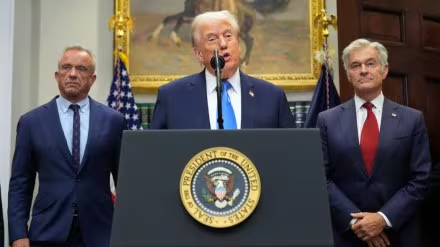Trump Announces 100% Tariff on Foreign-Made Films, Sparks Global Concerns
In a dramatic move that could reshape the global entertainment trade, US President Donald Trump announced on Monday that he will impose a 100% tariff on all movies produced outside the United States, arguing that foreign films are “stealing” America’s movie business.
Calling it a long-standing “never-ending problem,” Trump claimed Hollywood has been gutted by outside competition: Our movie-making business has been stolen from the United States of America, by other countries, just like stealing candy from a baby.
California, with its weak and incompetent Governor, has been particularly hard hit! Therefore, to solve this problem, I will be imposing a 100% tariff on any movies that are made outside of the United States,” Trump posted on Truth Social.
If enforced, this would mark the first time in US history that tariffs are applied on the cross-border delivery of digital services, setting a precedent with potentially far-reaching implications.
Why This Matters
Traditionally, films were distributed using 35mm physical prints shipped across borders. Today, almost all international film distribution is digital — through Digital Cinema Packages (DCPs) to theatres or directly to viewers via streaming platforms. That makes movies part of the broader category of digitally delivered services.
A tariff on such services could:
- Raise ticket prices in US theatres screening foreign films.
- Restrict access to global cinema for American audiences.
- Spark retaliatory tariffs by other countries, threatening Hollywood’s own billion-dollar overseas revenues.
- Jeopardize the principle of open digital trade, long protected under global trade agreements.
Who Is Affected?
- Global Streaming Giants: US-based companies like Netflix, Amazon Prime, and Disney may initially seem shielded, as they dominate streaming. But they rely heavily on licensing and distributing international content, which would also fall under the tariff net.
- Major Film Exporters: India (Bollywood), China, and South Korea, all of which have global platforms (Zee5, JioHotstar, iQIYI, Viu, TVING, Coupang Play), would face severe market barriers in the US.
- Independent Cinema & Art Films: Smaller international productions — often praised in film festivals and niche markets in the US — could be priced out altogether.
Expert Analysis
A research paper by Pritam Banerjee, Head & Professor at the Centre for WTO Studies, earlier this year warned that tariffs on films could trigger copycat measures worldwide.
If one accepts the principle that tariffs can be applied on digitally delivered services in contravention of existing multilateral or bilateral commitments, it can lead to other countries taking up similar measures for reasons of revenue maximisation or for protecting their domestic industry,” Banerjee wrote.
This could unravel decades of consensus under the World Trade Organization (WTO), which since 1998 has maintained a moratorium on customs duties on electronic transmissions.
The US itself had historically been the strongest advocate of keeping such services duty-free, even lobbying to make the moratorium permanent.
Legal Dilemma for Washington
Experts point out that the new tariffs contradict binding US commitments under the General Agreement on Trade in Services (GATS).
- Under GATS, the US has pledged market access and national treatment for foreign audio-visual services — including movies, radio, and television.
- A discriminatory tariff targeting foreign films directly violates this principle.
- Such a move risks trade disputes at the WTO, retaliatory countermeasures, and erosion of US credibility in trade negotiations.
The Bollywood Angle
For India’s film industry, the world’s largest by volume and one of the most globally consumed, Trump’s tariff announcement could be a body blow.
Bollywood and regional Indian cinema enjoy a massive diaspora audience in the US, where theatrical releases and digital platforms generate billions in revenue annually.
Industry insiders warn that:
- Ticket prices for Indian films in US theatres could double, making them less accessible to diaspora families who form the backbone of Bollywood’s overseas market.
- OTT giants like Netflix and Amazon, which heavily feature Indian content for their global subscribers, may scale back investments in licensing new Indian films if tariffs eat into profits.
- Independent Indian producers, who rely on overseas box office and digital rights to recover costs, could face financial collapse.
Film trade analysts caution that if India were to retaliate with similar tariffs on Hollywood films entering its massive domestic market, it could escalate into a trade war in entertainment, with audiences on both sides losing access to diverse cinematic experiences.
A Risky Gamble
What Trump frames as a way to “save American cinema” could instead backfire — alienating trading partners, undermining free digital trade principles, and depriving American audiences of diverse global content.
The ripple effects could extend well beyond film. If tariffs on digital services gain legitimacy, other sectors — from cloud computing to online education — could also face trade barriers, fracturing the open internet economy.
#TrumpTariffs #BollywoodImpact #HollywoodVsWorld #DigitalTrade #WTO #GlobalCinema #StreamingWars #TradeDispute #FreeTrade #EntertainmentIndustry




